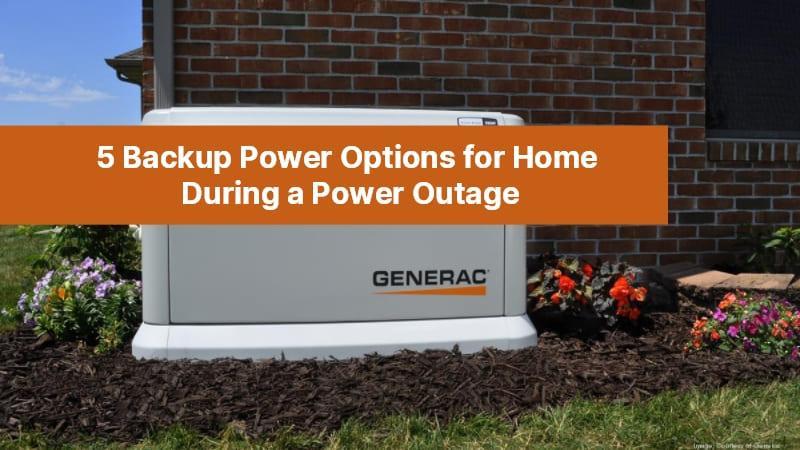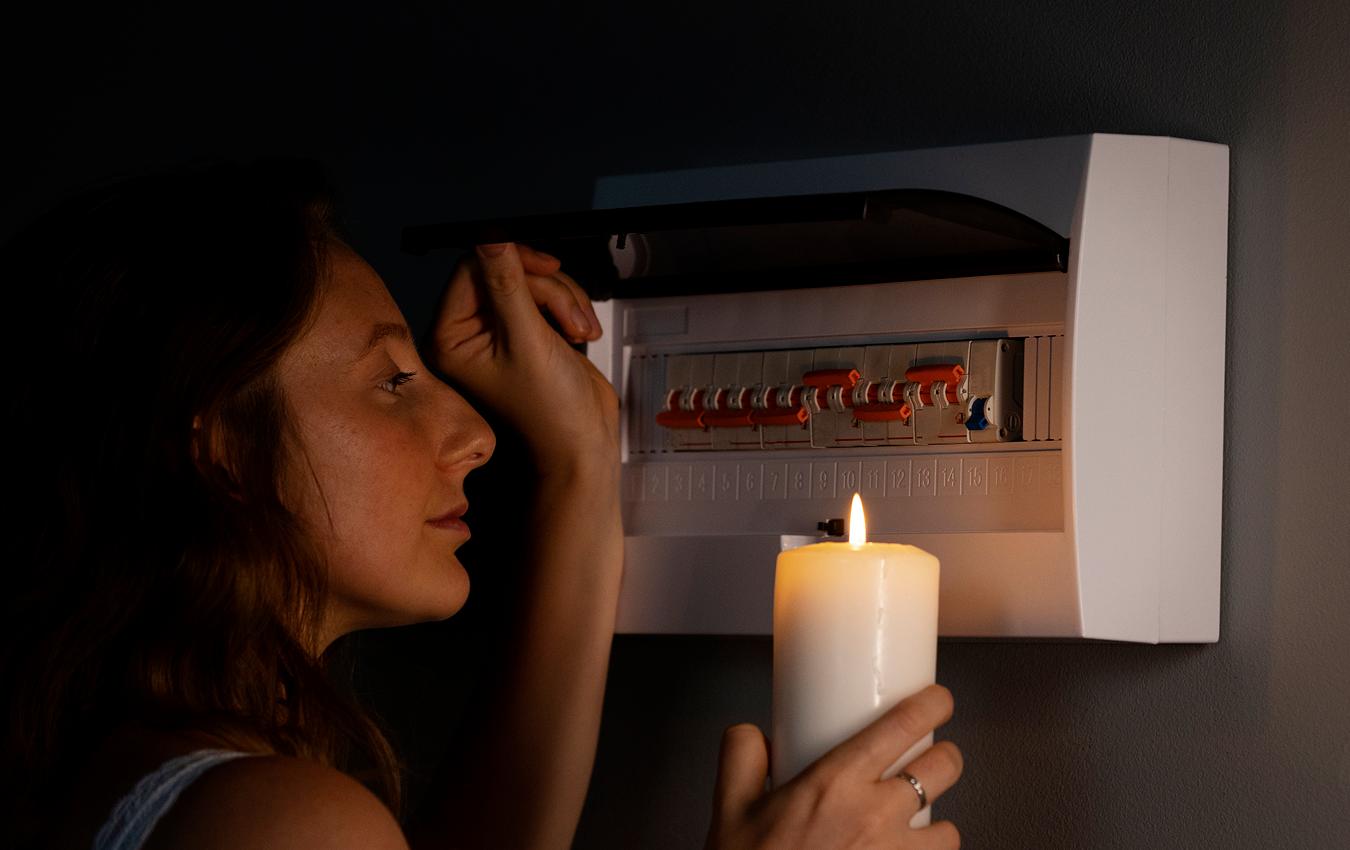Power outages can be inconvenient and even dangerous, especially during extreme weather conditions. That’s why it’s important to have a backup power plan in place. Here are five options to consider for keeping your home powered during an outage.
Portable Generators
Portable generators are a popular option for backup power during an outage. They come in a variety of sizes and can power essential appliances and electronics in your home. However, it’s essential to use them safely and follow manufacturer instructions to avoid carbon monoxide poisoning or other hazards. Make sure to have plenty of fuel on hand and keep the generator outside in a well-ventilated area.
Portable generators are a great option for backup power during a power outage. They are easy to move around and can power essential appliances and electronics in your home. However, it’s influential to use them safely and follow manufacturer instructions to avoid carbon monoxide poisoning or other hazards. Make sure to have plenty of fuel on hand and keep the generator outside in a well-ventilated area. It’s also a good idea to invest in a transfer switch, which allows you to safely connect the generator to your home’s electrical system. With a portable generator, you can have peace of mind knowing that you’ll have power when you need it most.
Generac Standby Generators
Generac standby generators are a reliable and convenient backup power option for your home. These generators are permanently installed outside your home and automatically turn on when the power goes out. They can power your entire home, including essential appliances like your refrigerator, heating and cooling systems, and lights. Generac standby generators run on natural gas or propane, so you don’t have to worry about refueling. Plus, they come with a warranty and 24/7 customer support for added peace of mind.
Generac standby generators are a popular choice for homeowners who want a reliable backup power option. These generators are designed to automatically turn on when the power goes out, so you don’t have to worry about manually starting them up. They can power your entire home, including essential appliances like your refrigerator, heating and cooling systems, and lights. Generac standby generators run on natural gas or propane, which means you don’t have to worry about refueling them. Plus, they come with a warranty and 24/7 customer support, so you can have peace of mind knowing that you’re covered in case of any issues. If you’re looking for a reliable backup power option for your home, consider a Generac standby generator.
Premier Electrical Services installs home backup systems with premium home Generac generators or Battery Backup Systems For Home. Request a customized quote to determine which redundant power system is best for you. Call us by phone, 954-900-1696 or request your free quote!
Solar Power Systems
Another backup power option to consider is a solar power system. These systems use solar panels to convert sunlight into electricity, which can then be stored in batteries for later use. While they may have a higher upfront cost, they can provide long-term savings on energy bills and are a more environmentally friendly option. Additionally, some solar power systems can be set up to automatically switch to back up power mode during an outage, ensuring your home stays powered even when the grid goes down.
Solar power systems are a great backup power option for those who want to reduce their carbon footprint and save money on energy bills eventually. These systems use solar panels to convert sunlight into electricity, which can then be stored in batteries for later use. They can be set up to automatically switch to back up power mode during an outage, ensuring your home stays powered even when the grid goes down. While they may have a higher upfront cost, the savings on energy bills and the environmental benefits make them a worthwhile investment for many homeowners. Additionally, some solar power systems can be easily installed and maintained, making them a convenient option for those who want a reliable backup power source.
Battery Backup Systems
Battery backup systems are a popular option for keeping your home powered during an outage. These systems use batteries to store energy, which can then be used to power essential appliances and electronics. They can be set up to automatically switch on when the power goes out, providing uninterrupted power to your home. Battery backup systems come in a range of sizes and capacities, so it’s important to choose one that meets your specific needs. Some systems can even be expanded over time, allowing you to add more batteries as your power needs grow.
One of the main benefits of battery backup systems is their portability. Unlike generators, which require fuel and can be heavy and difficult to move, battery backup systems are compact and easy to transport. This makes them a great option for camping trips or other outdoor activities where you require reliable power. Additionally, battery backup systems are quiet and produce no emissions, making them an environmentally friendly choice. With proper maintenance and care, a battery backup system can provide reliable backup power for years to come.
Fuel Cells
Fuel cells are another backup power option that can keep your home running during an outage. These devices use hydrogen and oxygen to create electricity, with the only byproduct being water. Fuel cells are highly efficient and can provide continuous power for days or even weeks, depending on the size of the system. They are also environmentally friendly, producing no emissions or pollutants. However, fuel cells can be expensive to install and maintain, and may not be practical for all homes. It’s important to do your research and consult a professional before investing in a fuel cell backup power system.
Fuel cells are a great option for those looking for a backup power source that is both efficient and environmentally friendly. They are particularly useful for homes that are off the grid or in areas prone to power outages. Fuel cells can be sized to meet the specific needs of your home, and can provide continuous power for days or even weeks. However, they can be expensive to install and maintain, and may not be practical for all homes. It’s significant to do your research and consult a professional before investing in a fuel cell backup power system. With the right setup, fuel cells can provide reliable backup power and peace of mind during an outage.
Installing a Generac generator for the home as backup power
Installing a Generac generator for your home can be a big investment, but it’s well worth it. Generators provide peace of mind by providing power during outages, and they can save you thousands of dollars by reducing the cost of your monthly energy bill. If you’re contemplating installing a generator for your home, here’s what you need to know about the cost of installation.
How much does it cost to install a Generac generator?
The cost of installing a Generac generator for your home can vary depending on the size of the generator and the complexity of the installation. On average, homeowners can expect to pay between $3,000 and $6,000 for a basic installation. However, larger generators or more complex installations can cost upwards of $10,000. It’s important to get a quote from a licensed installer to get an accurate estimate for your specific needs.
What elements influence the cost?
There are several factors that affect how much it costs to install a Generac generator for your home:
Generator type
Standard generators typically cost less than standby units because they are easier to install and maintain. Standby generators have many additional features such as automatic start/stop circuits and battery backup systems that make them pricier to install and operate.
Size of a generator
The size of your home will determine how much power you require from your generator to operate all its appliances during an outage. You’ll need to consider how many watts each appliance uses, then add them together to determine how large your generator needs to be. For example, if you have 2 TVs that use 100 watts each and 2 lamps that use 60 watts each, you would need approximately 1,300 watts total (2 x 100 + 2 x 60). A standard residential standby generator would likely be able to handle this.
Smaller generators typically cost less than larger generators because they require fewer materials and labor hours to install. However, homeowners who want more power or want backup power in case of an outage may opt for larger generators instead.
Generator sizes range from 3 kVA (kilovolt-amperes) up to 34 kVA (kilovolt-amperes). The larger your generator is, the more expensive it will be because it requires more parts and labor hours to install. For example, installing a 15 kVA unit will cost around $5,500 while installing a 34 kVA unit can run up to $13,500 depending on where you live and if you’re installing it yourself or hiring someone else to do the work for you.
Once you’ve decided on which size generator is right for you, there are several factors that affect the price, such as labor costs and material costs like concrete pads and grounding cables (if needed). All this, you can discuss and request a quote for the cost of installing a backup power system for your home from Premier Electrical Services right now!
Check out other interesting news:
- Commercial Energy Audit: Spotting the Sources of Energy Waste
- Protect Your Fort Lauderdale Home with Whole-House Surge Protection
- Power Outages in Fort Lauderdale: How to Protect Your Home
- Preparing for a Home Rewiring Project: A Checklist for Homeowners
- 5 Critical Signs You Need a Whole-House Surge Protector





